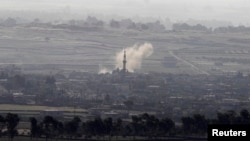Recent airstrikes in Syria have drawn a range of world reaction, as Israel insisted any action was directed at Hezbollah militants, while Syrian officials said the attacks showed Israel's alliance with "terrorists" in Syria.
In a telephone call Monday with Russian Foreign Minister Sergei Lavrov, Syrian Foreign Minister Walid al-Moallem accused Israel of working with Western nations to undermine Syria, and said his country has a right to respond.
Russia, along with China and U.N. Secretary-General Ban Ki-moon, expressed concern about the airstrikes and the threat that the crisis in Syria could spread.
Russian President Vladimir Putin is expected to discuss the issue Tuesday in a meeting with U.S. Secretary of State John Kerry in Moscow.
The Britain-based Syrian Observatory for Human Rights said the Sunday airstrikes on a large military complex near Damascus killed at least 42 soldiers. The Syrian government has not released a death toll, but state media reported there were casualties.
Israeli lawmaker Tzachi Hanegbi, who is close to Prime Minister Benjamin Netanyahu, did not confirm Israel was behind the airstrikes, but said Monday if there was any Israeli activity, it was against Lebanon-based Hezbollah and not Syria.
Anonymous intelligence sources in the Middle East said Israel targeted highly accurate Fatah-110 guided missiles shipped from Iran and stored in a warehouse at Damascus International Airport that were intended for Hezbollah militants to use against Israel.
The Iran-backed group is allied with Mr. Assad's government and waged a brief war with Israel in 2006.
Some analysts say Iran has tried to use the threat of a Hezbollah missile attack against Israel as a means of deterring Israel from attacking Iranian nuclear installations that Israeli and American officials believe are part of an Iranian nuclear weapons program.
Israel has warned repeatedly that it will not allow Hezbollah to receive what it calls "game changing" weapons.
Some information for this report was provided by AP.
In a telephone call Monday with Russian Foreign Minister Sergei Lavrov, Syrian Foreign Minister Walid al-Moallem accused Israel of working with Western nations to undermine Syria, and said his country has a right to respond.
Russia, along with China and U.N. Secretary-General Ban Ki-moon, expressed concern about the airstrikes and the threat that the crisis in Syria could spread.
Russian President Vladimir Putin is expected to discuss the issue Tuesday in a meeting with U.S. Secretary of State John Kerry in Moscow.
The Britain-based Syrian Observatory for Human Rights said the Sunday airstrikes on a large military complex near Damascus killed at least 42 soldiers. The Syrian government has not released a death toll, but state media reported there were casualties.
Israeli lawmaker Tzachi Hanegbi, who is close to Prime Minister Benjamin Netanyahu, did not confirm Israel was behind the airstrikes, but said Monday if there was any Israeli activity, it was against Lebanon-based Hezbollah and not Syria.
Anonymous intelligence sources in the Middle East said Israel targeted highly accurate Fatah-110 guided missiles shipped from Iran and stored in a warehouse at Damascus International Airport that were intended for Hezbollah militants to use against Israel.
The Iran-backed group is allied with Mr. Assad's government and waged a brief war with Israel in 2006.
Some analysts say Iran has tried to use the threat of a Hezbollah missile attack against Israel as a means of deterring Israel from attacking Iranian nuclear installations that Israeli and American officials believe are part of an Iranian nuclear weapons program.
Israel has warned repeatedly that it will not allow Hezbollah to receive what it calls "game changing" weapons.
Some information for this report was provided by AP.





